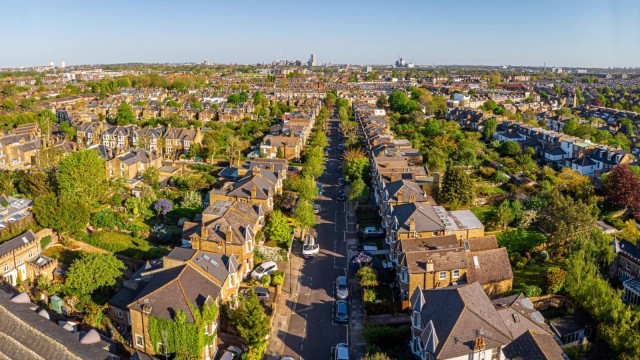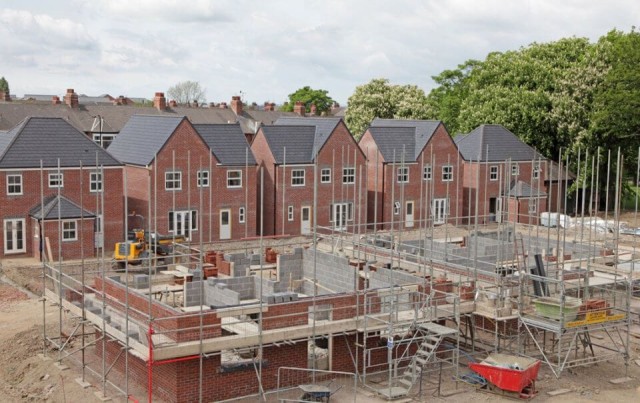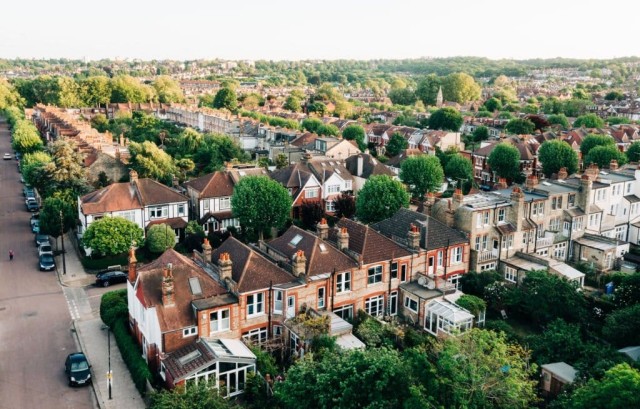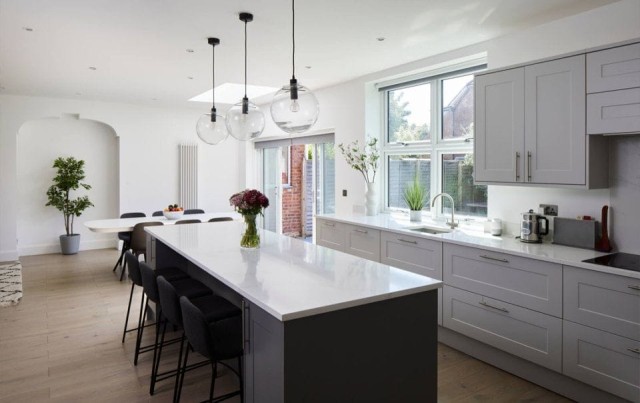Read next
The latest news, updates and expert views for ambitious, high-achieving and purpose-driven homeowners and property entrepreneurs.


Should you buy your property through an estate agent or at auction?
With property prices seemingly on an almost endless upward trajectory, it is getting harder and harder for those not on ‘the ladder’ to get on it. With the average deposit in excess of £30k, it’s easy to see why some house hunters may start to think that they’ll never have a home of their own.
There’s no other way to do it though, is there?
Well, the first thing most of us think when we set out to buy a house is “which estate agent should I go with?” and whilst this well-trodden path is by far the most popular, it certainly isn’t the most cost-effective one when compared to buying property at an auction.
Some like the ‘hands off’ approach that comes with instructing an agency to take care of everything, but it will come as no surprise that this convenience comes at a premium. By the same token, there are those who are also put off by not completely comprehending how house auctions actually work.
So, with this in mind, we thought we’d take a look at the pros and cons of both, in order to help you understand which may be best for you.
So, let’s take a look at the differences between buying through an estate agent and buying at auction.
When buying from an estate agent, the price listed is agreed between the seller and the agent whilst being set accordingly. Now, there is room for negotiation, as many people will set the price higher, with a view to getting ‘knocked down’ to a price they’re still happy with. That being said, supply and demand also plays its part well in how malleable the prices are, as when the market is booming, sellers are much less likely to accept a reduced offer than when the conditions can be described as a ‘buyers market’.
Pricing at an auction couldn’t be more different. The price quoted by an auctioneer is simply a reserve or ‘guide price’ which is by no means any indication of what the actual final price will be. There are three different ‘prices’ you’ll need to be aware of.
Allow me to explain...
1) The reserve price
First of all, during an auction, the reserve price is the minimum amount that will need to bid to achieve a sale. Anything below this figure, will not be enough to trigger the purchase and the property will remain unsold.
2) The guide price
Now, something else you’ll need to be aware of is the guide price. This is typically set 10% below the reserve price. As the name suggests, it’s a guide for the assembled bidders and isn’t necessarily enough to win the listing overall.
3) The final sale price
Finally, the final sale price. This figure is entirely dependent on the outcome of the auction and it can be much higher than the both the guide and reserve price, especially if the property is a desirable one in a sought-after area.
However, what is clear is that there are some real bargains to be had via an auction when compared to the agency route. It may take a keen eye as well as a lot of research and a steady nerve, but significant savings can be made. It can also be an exciting thing to be involved with and not something particularly suited to those with a faint heart, but there are some real treasures out there, believe me!
If you’ve ever bought a house via the traditional agency route, you’ll know that the buying process can be quite a long and drawn-out one. By this I mean, there’s an opening offer, perhaps a counteroffer or a rebuff, an agreeance to sell and that’s just the beginning of it all!
Then once the house is sold ‘subject to contract’, there are all the checks and surveys, then if you’re lucky, it’ll be that big moment of exchanging contracts. Now, I know it can be painstaking, but it’s ultimately a rewarding journey and one that couldn’t be more different to the auction process.
Homes listed by an estate agent can be on the market from just a few weeks to several months. This all depends on the price, condition, and overall market value. This is in stark contrast to properties at an auction, which don't hang around for long.
The period in between the release of the auction catalogue to sale on the auction day can be as little as a fortnight.
In fact, from the moment you turn to view, bid, and hopefully win the auction, it could be a matter of hours from a first view to actually owning the property.
Drastically different paths that both end with you as a proud homeowner.
This aspect of when the whole thing becomes legally binding is another area where these two ways of purchasing property greatly differ.
When an offer is accepted via an estate agent's, yes it feels good, but it essentially doesn’t mean a thing until the contracts are exchanged and it is all made official. Until that point, both the seller and the buyer can change their minds at any point or for any reason, so the agreement is practically only as strong as the intentions of each party involved.
After this point, both the buyer and seller may still pull out of the sale. However it will normally cost either party thousands in fees and penalties, effectively making it a de facto binding contract.
This process of an auction is very different, in that moment the hammer falls and the bidding ends, the sale completes. It is an utterly binding arrangement that would take the risk of major legal penalties to break and pull out.
Properties seen for sale at auction are typically unmodernised and in need of a little TLC, usually for reasons that have led to it becoming available for purchase in this way in the first place.
Estate agents, however, know what sells and will advise their clients to fully prepare their property for sale, so at the very least, homes viewed will normally be well presented and more often than not, lived in.
A house will come to auction because either...
The owner needs to get rid of the property: It could be that the seller is desperate for a quick sale and is willing to risk receiving much less for their property to get it sold fast! It’s a calculated gamble for the seller, but typically speaking a buyer can realistically aim for up to 20% discount off the average price of a home, though you could easily receive as much as you would privately if there is a lot of interest.
Or...
It’s a repossessed property: So when a bank forecloses on a mortgaged property, a financial institution neither has the time nor the will to sell a home privately. So this will typically be sold at an auction to hopefully recover the money from the debtor.
Or for instance…
It’s a local council property: Often, local councils will sell off housing stock to generate funds for other projects, which can be of particular benefit to the budding house hunter. The simple truth is, be in the right place at the right time and you could bag yourself a real bargain, especially if you’re the only one putting in a bid!
The official documentation and checking for the appropriate financing to complete the sale will happen at different times in each method of house purchases. In a private treaty sale (via the estate agents), the relevant checks are made after the acceptance of the offer, so it’s a good idea to have this side of things boxed off before making offers on any properties.
Where auctions are concerned, the checks are made before any of the bidding takes place, so as to avoid delays. This is known as ‘pre sale diligence’.
In 9 out of 10 cases, the exchange of contracts is triggered the moment the hammer falls. However, there is a new-ish concept called the conditional sale that exists in the UK, whereby the bidder is simply buying the option to purchase at the price bid. Currently, just under 1 in 10 auctions in England are conducted on this conditional basis.
It’s important to understand exactly what your obligations are to the auctioneer when making your bids, as terms may differ from auction to auction. Generally speaking, you’ll have up to around 28 days in which to tie up all the relevant due diligence and perform the exchanging of the contracts. If you fail to do so, you’ll more than likely lose the fee you paid for the option.
It’s so important,we’ll say it again…. Check your obligations or it could cost you thousands!
One of the potential major drawbacks of buying through an estate agent is the tricky paradigm of the housing purchase chain. An indeterminate amount of property sales and purchases, all relying on each other to complete. A chain like this is only as strong as its weakest link, so if just one of the buyers in the chain drops out, it can put a stop to every other purchase and sale in the chain. This is something that tends to happen at the upper end of the market, where the amount of buyers is limited.
The housing chain is not an issue with houses you find at auction, as most still opt for the estate agent option for ease and safety reasons. When you buy a property at auction, the vast majority will not be part of a chain and all the complications that come with them.
This is a bit of a ‘biggie’ and will sort the men from the boys, so to speak, as the point the deposits are taken can be a deal breaker for any prospective buyer. With a standard private sale, the deposit only becomes payable either on exchange day or completion day, depending on how the solicitor’s side of things progresses. What does this mean? You practically don’t lay out a penny until virtually the last moment of the process.
This is the most easily ‘doable’ scenario for the majority of people, as it doesn’t require much money upfront.
The auction is a different kettle of fish, as they say, as the deposit is taken on the morning of the bidding and is normally around 10% of the total proposed guide price. With average house prices running into the hundreds of thousands of pounds, 10% usually represents a tidy sum, perhaps as much as £60k-£70k depending on the property and location.
Now, if you decide you would like to opt for a house purchase via auction, you’ll need to have this amount of funds available to you to be able to bid. You’ll also need to have a mortgage agreed in principle with you for the rest of the purchase price and be able to show evidence of it on the morning of the auction.
When you take the auction route, you will avoid costly agency fees, but there will be some other costs relating to the sale that you won’t be able to sidestep. Stamp duty is one the other things that you’ll have to remember to factor into your budgeting.
To give you an idea of how much that could be when you buy a home in the UK, you’ll pay nothing if the property is valued at £125k or less. Should you be going for a home that costs more than £125k and less than £250k, you’ll pay 2% of the amount over £125k (i.e. if the total cost is £150k, you’ll pay 2% of the £25k that’s over the first limit).
Should you be lucky enough to be able to afford a home in the £250k to a £500k range, you’ll then pay 5% of any figure over £250k plus the 2% figure mentioned above.
However, the good news is that if you’re a first-time buyer, this tax is a little kinder to you, as you’ll not paying a penny up to £300k and just 5% on the figure between £300k and £500k.
You’ll also have to consider any auction fees that will almost certainly be payable. There’s an administration fee of around about £150 to pay the auctioneers and then what’s known as a buyer’s premium that goes directly to the auction house and is typically around 1-2% of the asking price.
If you don’t take account of these things, you could end up with some pretty major egg on your face and a lot of running around trying to raise the cash, so beware!
As far as purchasing a house through an estate agency goes, getting started is a fairly simple process. You find out what your budget is, based on affordability and you approach one or two of the estate agencies who offer properties in the area you’re looking to live. Then it’s just a case of arranging viewings and so on...
When it reaches the stage of choosing the auction method of house purchase, there’s a little more preparation to be done. Now, first thing is to find out where house auctions are being held and request a catalogue of all the properties to be bid on. This publication should include all the relevant information, such as guide price, condition etc.
Any solicitor worth his or her salt will ask for what’s known as a legal pack from the auction house that will contain things like authority searches, land registry entry and all manner of legalese required when buying a home. It’s important to pay particularly close attention to what’s in this legal pack, as there could be special conditions that have affected the cost, meaning your bargain suddenly doesn’t look such a good one.
If you’re worried about going to an auction and committing a huge sum of money on what can seem like the turn of a card, it is recommended that you go and sit in on an auction as an observer to get a feel for what happens.
Don’t worry, if you don’t place a bid, you won’t be asked to put down a deposit before things begin!
There are certainly pluses and minuses to each method of buying a home, with the estate agent route representing the safe, methodical approach that is certain to take much longer and cost much more in the long run. However, it must be remembered that the seemingly endless red tape involved in buying a house this way is there for a reason, to protect everyone involved.
The auction route is a fantastic method for those with the means and the ambition to find either a ‘fixer upper’ at a great price or simply a great deal on a home. What shouldn’t be glossed over, however, are the pitfalls and extra conditions that can drastically affect what you pay and in turn, what you’re paying for.
Get it right though and the ends most definitely justify the means.
Whichever way you’re intending to buy the home of your dreams, remember to do your homework, make sure all the figures add up and be careful not to commit to anything before you fully understand everything.
We wish you the very best of luck in your search for your ideal property.

Urbanist Architecture’s founder and managing director, Ufuk Bahar BA(Hons), MA, takes personal charge of our larger projects, focusing particularly on Green Belt developments, new-build flats and housing, and high-end full refurbishments.
We look forward to learning how we can help you. Simply fill in the form below and someone on our team will respond to you at the earliest opportunity.
The latest news, updates and expert views for ambitious, high-achieving and purpose-driven homeowners and property entrepreneurs.
The latest news, updates and expert views for ambitious, high-achieving and purpose-driven homeowners and property entrepreneurs.










We specialise in crafting creative design and planning strategies to unlock the hidden potential of developments, secure planning permission and deliver imaginative projects on tricky sites
Write us a message